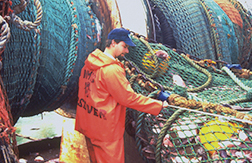On the eve of NMFS resuming at-sea observer coverage, the Mid-Atlantic Fishery Management Council asked the agency to again extend its covid-19 waiver on deploying observers in the Greater Atlantic region.
“Given the continued transmission of the covid-19 virus, we do not believe the observer program can be safely operated at this time,” wrote council chairman Michael Luisi in an Aug. 13 letter to NMFS regional director Michael Pentony and Jon Hare, science and research director at the Northeast Fisheries Science Center.
“According to the Centers for Disease Control, when we last communicated on this issue (June 23, 2020), the 7-day new case average was under 30,000 new cases per day. On August 11, 2020, the national 7-day average of new cases was over 52,000 new cases per day,” the letter states.
“Given the ongoing community transmission of the virus and the particularly high risk of transmission in the close quarters onboard a vessel, we believe that deploying observers on fishing vessels at this time poses an unwarranted risk to fishermen, observers, and associated communities.”
Council members talked about that concern during their online August meeting this week and approved a recommendation to extend the observer and monitor waiver on permitted commercial fishing vessels through Dec. 31.
Holding back on observer redeployment would also “align with NOAA Fisheries’ recent decision to cancel several at-sea surveys ‘due to the uncertainties created by the COVID-19 pandemic and the unique challenges those are creating for NOAA Fisheries,’” the letter says, quoting the agency’s recent announcement on cancelling those research cruises.
“In evaluating when and how to redeploy observers, we encourage you to consider not only the health risks to individuals onboard the fishing vessels but also the potential lost wages/revenues and liabilities if a vessel cannot operate due to an infection caused by an observer,” the letter states.
Lastly the letter raises an issue of potential liability resulting from any covid-19 infections linked to the observer program: “We still have not yet received an official response to the following question posed to you in our June 23, 2020 letter: ‘Given the known risks of the ongoing pandemic, is NOAA planning to assume liability for the health costs and other legal or financial ramifications resulting from an infection transmitted by an observer?” (The same question would apply to an infection transmitted to an observer.)”
“The Council recognizes and appreciates that observers provide valuable data and support the effective management of U.S. fisheries,” the letter concludes. “As part of the motion approved at our August 2020 meeting, we have directed staff to commence discussions and analyses with NMFS staff regarding the science and management impacts of this waiver extension.”







